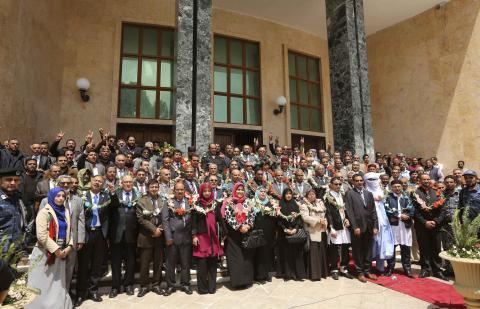Advertisement
Libya's Constitution-Drafting Body Starts Work
BAYDA, Libya (Reuters) - A special body to draft a new constitution for Libya convened in the volatile east on Sunday, a milestone in the bumpy transformation of the North African country since the 2011 ouster of Muammar Gaddafi.
The 47 elected committee members gathered in the city of Bayda east of Benghazi, in the building that housed parliament when the country gained independence in 1951.
The body, drawn equally from all regions, will have 120 days to draft a constitution though analysts expect the process to take much longer given growing chaos as well as tribal and political divisions.
"The constitution should be finished in eight months," Mohamed Al-Tumi, a member from the capital Tripoli, told Reuters after a brief ceremony attended by tribal and community leaders during which the national anthem was played.
Libya desperately needs a viable government and system of rule so that it can focus on reconstruction and on healing the divisions exposed by the NATO-backed campaign against Gaddafi.
The body was meant to have 60 members but violence in Derna, an Islamist hotspot in the east, and several southern areas made it impossible to hold elections there.
The Amazigh or Berber minority also boycotted the committee to demand more rights, reflecting the turmoil gripping the major oil producer.
FACTORS TO CONSIDER
"The elections have not been completed so anyone can challenge the work of the committee by filing a petition to the constitutional court," said Tawfiq al-Shahaibi, a former lawmaker.
Libya used a similar model for the committee that drafted the constitution that was implemented when the country, then a monarchy, gained independence in 1951.
The new document's authors will need to take into account deepening political and tribal rivalries, as well as demands for more autonomy for the east, when deciding what political system Libya will adopt. Their draft will be put to a referendum.
Libya's parliament passed a resolution late last year that declared Libya is a Muslim country and the Islamic legal and moral code of sharia is the binding source of its legislation.
In the east, the weak interim government managed to negotiate with rebels an end to their seizure of major oil ports but their demands for a federalist system guaranteeing regional autonomy remain popular.
In the west, tribesmen and striking state security guards have blocked pipelines and oilfields to make financial and political demands.
Gaddafi ostensibly ruled Libya under a bizarre set of laws prescribed in his Green Book. In practice he and his family ran a totalitarian state where no political opposition was tolerated and rival tribes were paid off or played off against each other.
(Additional reporting by Ahmed Elumami in Benghazi; Writing by Ulf Laessing; Editing by Tom Heneghan)



















Add new comment